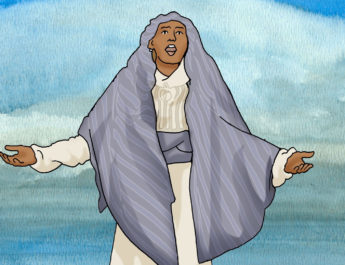Mark 10:46-52
Ordinary B48
46 They came to Jericho.A As he and his disciplesB and a largeC crowd were leavingD Jericho,
A “Jericho” = Hiericho. 7x in NT. From Hebrew Yriychow (Jericho); {perhaps from yareach (moon); {from the same as yerach (month)} OR from ruach (small, breathe, perceive, anticipate, accept, enjoy).}. This is Jericho, meaning either “fragrant” or “moon.”
B “disciples” = mathetes. From matheteuo (to make a disciple of); from manthano (to learn key facts, gain knowledge from experience; generally implies reflection as part of the learning process); from math– (thinking things through). This is a disciple, learner, or student. It is where we get “mathematics” from.
C “large” = hikanos. From hikneomai (to reach, come to, attain). This is sufficient, suitable, adequate, competent, ample.
D “leaving” = ekporeuomai. From ek (from, from out of) + poreuomai (to go, travel, journey, die; refers to transporting things from one place to another; focuses on the personal significance of the destination); {from poros (passageway)}. This is to go forth, depart from, be spoken, flow out, project. This word emphasizes the result a process or passage – how it impacts the person or thing.
E “Bartimaeus” = Bartimaios. Related to “Timaeus” in v46. 1x in NT. From Aramaic bar (son literal or figurative, age); {corresponding to Hebrew ben (son literal or figurative, subject, age); from banah (to build or obtain children)} + timaios (see note G below). This is Bartimaeus, literally “son of Timeaus” or “son of he who’s highly prized,” “ son of honor.” See https://www.abarim-publications.com/Meaning/Bartimaeus.html
F “son” = huios. This is son, descendant – a son whether natural born or adopted. It can be used figuratively for other forms of kinship.
G “Timaeus” = Timaios. 1x in NT. Probably from timao (properly, this is setting a value or price on something, to estimate. Figuratively, it speaks to what level of honor we afford someone or something depending on our personal feeling toward it. By implication, this can mean to revere or honor); from time (worth or perceived value; literally, price, but figuratively, the honor or value one sees in someone or something; can be esteem or dignity; can also mean precious or valuables); from tino (to pay, be punished, pay a penalty or fine because of a crime); from tio (to pay respect, value). This is Timaeus or Timay. It is a name that means, “highly prized.”
a blindH beggar,I was sittingJ by the roadside.K
H “blind” = tuphlos. Derivation unclear. Perhaps from tuphoo (to be conceited, foolish, puffed up, haughty; properly, to blow smoke; figuratively being muddled or cloudy in mind; poor judgment that harms spiritual clarity; also, being covered with smoke – so filled with pride); from tuphos (smoke, vanity, arrogance); from tupho (to raise smoke, smolder, slowly consume without flame). This is blind or a blind person – perhaps in the sense of smoke making things opaque and impossible to see. This is blind literally or figuratively.
I “beggar” = prosaiteo. 3x in NT. From pros (at, to, toward, with, among) + aiteo (to ask, demand, beg, desire). This is to beg, ask for over and over again, solicit.
J “sitting” = kathemai. From kata (down, against, throughout, among) + hemai (to sit). This is to sit, be enthroned, or reside.
K “roadside” = hodos. This is way, road, path, or journey. It can imply progress along a route.
47 When he heardL that it was JesusM of Nazareth,N
L “heard” = akouo. This is hear or listen, but it also means to understand by hearing. This is where the word “acoustics” comes from.
M “Jesus” = Iesous. From Hebrew Yehoshua (Joshua, the Lord is salvation); {from YHVH (proper name of the God of Israel; the self-existent and eternal one); {from havah (to become) or from hayah (to come to pass, become, be)} + yasha (to deliver, defend, help, preserve, rescue; properly, to be open, wide or free, which implies being safe. So, in a causative sense, this is to free someone)}. This is Jesus or Joshua in Greek – the Lord saves or the Lord is salvation.
N “Nazareth” = Nazarenos. 6x in NT. Probably from Nazara (Nazareth); perhaps from netser (branch) OR from natsar (to watch, guard, protect). This is Nazarene. See https://en.wikipedia.org/wiki/Nazareth
he beganO to shout outP and say, “Jesus, Son of David,Q have mercyR on me!”
O “began” = archomai. From archo (to rule, begin, have first rank or have political power). This is to begin or rule.
P “shout out” = krazo. This is to cry out, scream, shriek. It is onomatopoeia for the sound of a raven’s call. Figuratively, this means crying out urgently without intelligible words to express something that is deeply felt.
Q “David” = Dauid. From Hebrew David (David); from the same as dod (beloved, love, uncle); the root may mean to boil, which is used figuratively to describe love. So, this implies someone you love such as a friend, a lover, or a close family member like an uncle. David’s name likely means something like “beloved one.”
R “have mercy” = eleeo. From eleos (mercy, pity, tender mercy, or compassion; generally understood in action by word or deed). This is to have pity on, show mercy to, be compassionate; often used for God’s grace. When we sing or say “kyrie eleison” (Lord, have mercy), it is from this root verb.
48 ManyS sternly orderedT him to be quiet,U but he cried outV even more loudly,W “Son of David, have mercy on me!”
S “many” = polus. This is much, often, plenteous – a large number or a great extent.
T “sternly ordered” = epitimao. Related to “Timaeus” and “Bartimeaus” in v46. From epi (on, upon, against, what is fitting) + timao (see note G above). This is to render what is due – to assign the value that is appropriate for the situation. So, it could mean to honor or to warn, to rebuke or to charge. Generally, it is a warning meant to guide someone away from doing something wrong or taking the wrong path. It can imply to forbid.
U “be quiet” = siopao. 10x in NT. From siope (silence or muteness). This is to be silent whether by choice or not. Figuratively, this is being calm as water, keeping one’s peace.
V “cried out” = krazo. Same as “shout out” in v47. See note P above.
W “even more loudly” = polus + mallon. Polus is the same as “many” in v48. See note S above. Mallon is rather, more than, or better.
49 Jesus stood stillX and said, “CallY him here.”
And they called the blind man, saying to him, “Take heart;Z get up,AA he is calling you.”
X “stood still” = histemi. This is to stand, place, establish, appoint, stand ready, be steadfast.
Y “call” = phoneo. From phone (voice, sound, tone or noise; also a language or dialect); probably from phemi to declare, say, use contrasts in speaking to shed light on one point of view); {from phao (to shine) or phaino (to bring light, cause to appear, shine, become visible or clear). This is to call out, summon, shout, address. It is making a sound whether of an animal, a person, or an instrument.
Z “take heart” = tharseo. 7x in NT. From tharsos (courage, confidence, boldness); from thrasus (bold, daring). This is to have courage or good cheer, to be bold or confident.
AA “get up” = egeiro. This is to awake, raise up or lift up. It can be to get up from sitting or lying down, to get up from sleeping, to rise from a disease or from death. Figuratively, it can be rising from inactivity or from ruins.
50 So throwing offBB his cloak,CC he sprang upDD and came to Jesus.
BB “throwing off” = apoballo. 2x in NT. From apo (from, away from) + ballo (to throw, cast, place, put, drop). This is to throw off, cast aside. Figuratively, it is to lose or abandon.
CC “cloak” = himation. From heima (garment) OR from ennumi (to put on). This is the outer garment, cloak, robe, or mantle. It is worn loosely over a tunic.
DD “sprang up” = eispedao. 3x in NT. From eis (to, into, for, among) + pedao (to leap or spring). This is to rush in or spring in.
51 Then Jesus said to him, “What do you wantEE me to doFF for you?”
The blind man said to him, “My teacher,GG let me see again.”HH
EE “want” = thelo. This is to wish, desire, will, or intend. It is to choose or prefer in a literal or figurative sense. It can also mean inclined toward or take delight in. It can have a sense of being ready to act on the impulse in question.
FF “do” = poieo. This is to make, do, act, construct, abide, or cause.
GG “my teacher” = Rhabbouni. 2x in NT. From rhabbi (a title of respect for a teacher-scholar; literally, great one or honorable sir; also my master or my teacher); from Hebrew rab (chief); from rabab (to be many, increase, multiply). This is Rabbi, Lord, my master, my teacher in Aramaic.
HH “see again” = anablepo. From ana (up, back, again, among, between, anew) + blepo (to see, used primarily in the physical sense; figuratively, seeing, which includes attention and so to watchfulness, being observant, perceiving, beware, and acting on the visual information). This is to look up or regain sight.
52 Jesus said to him, “Go;II your faithJJ has made you well.”KK
II “go” = hupago. From hupo (by, under, under the authority of) + ago (lead, bring, guide, spend, drive, carry). This is to lead under so to depart, go away, or die. It is to lead away under the command of someone else, being given a mission or objective to carry out.
JJ “faith” = pistis. From peitho (to have confidence, urge, be persuaded, agree, assure, believe, have confidence, trust). This is less about knowing, believing, and repeating a list of doctrines then it is about trusting God. Faith means listening to God and seeking to live a holy life even (and especially) when we don’t understand how everything works or fits together. Faith is about being faithful (trusting and doing) rather than being all knowing.
KK “made…well” = sozo. From sos (safe, rescued, well). This is to save, heal, preserve, or rescue. Properly, this is taking someone from danger to safety. It can be delivering or protecting literally or figuratively. This is the root that “savior” and “salvation” come from in Greek.
ImmediatelyLL he regained his sightMM and followedNN him on the way.OO
LL “immediately” = eutheos. From euthus (immediately, upright, straight and not crooked); {perhaps from eu (good, well, well done, rightly) + tithemi (to place, lay, set, establish)}. This is directly, soon, at once.
MM “regained…sight” = anablepo. Same as “see again” in v51. See note HH above.
NN “followed” = akoloutheo. From a (with, fellowship, union) + keleuthos (road, way). This is to accompany or follow someone, especially the way a disciple does.
OO “way” = hodos. Same as “roadside” in v46. See note K above.
Image credit: “Jesus Heals a Blind Man” by LUMO Project.




